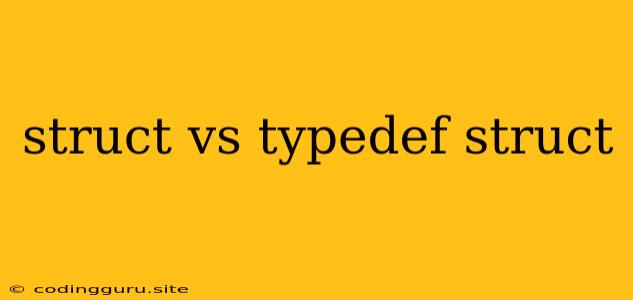Understanding the Difference Between struct and typedef struct in C
In the realm of C programming, the struct keyword plays a crucial role in defining custom data types known as structures. Structures allow you to group variables of different data types under a single name, providing a structured approach to managing complex data. While struct defines the blueprint for these structures, typedef struct introduces a convenient alias or synonym for the structure.
What is a struct?
A struct is a user-defined data type in C that encapsulates variables of different data types under a single name. It provides a way to organize and access related data in a structured manner. Here's how a simple struct is defined:
struct Point {
int x;
int y;
};
This code defines a struct named Point with two integer members: x and y.
Why Use struct?
structs offer several advantages over using individual variables:
- Organization: They provide a way to group logically related data, enhancing code readability and maintainability.
- Data Integrity: By defining a structure, you enforce a specific organization for your data, promoting consistency.
- Efficient Memory Management:
structs allow you to allocate memory for multiple data members in a contiguous block, potentially improving memory efficiency.
What is typedef struct?
typedef is a C keyword used to create an alias or synonym for a data type. When combined with struct, it allows you to define a new name for a structure, making it easier to use and refer to the structure in your code.
How to Use typedef struct
Here's how you can use typedef struct to create a new name for the Point structure:
typedef struct {
int x;
int y;
} Point;
With this typedef, you can now declare variables of type Point directly, without using the struct keyword:
Point p1, p2;
What's the Difference?
The core difference between struct and typedef struct lies in how you declare variables:
-
struct: To declare a variable using astruct, you need to use thestructkeyword followed by the structure name:struct Point p; -
typedef struct: After usingtypedef struct, you can declare a variable directly with the new name you defined:Point p; // No need for 'struct' keyword
Why Use typedef struct?
- Simplicity: It simplifies variable declaration, reducing code clutter and making it more readable.
- Consistency: It promotes a consistent naming convention, making your code more maintainable.
- Type Aliases:
typedef structis particularly useful when you need to define complex data structures or create type aliases for them.
Examples
Let's illustrate the difference with an example:
Using struct
#include
struct Student {
char name[50];
int rollNo;
float marks;
};
int main() {
struct Student student1;
strcpy(student1.name, "Alice");
student1.rollNo = 101;
student1.marks = 90.5;
printf("Name: %s\n", student1.name);
printf("Roll No: %d\n", student1.rollNo);
printf("Marks: %.2f\n", student1.marks);
return 0;
}
Using typedef struct
#include
typedef struct {
char name[50];
int rollNo;
float marks;
} Student;
int main() {
Student student1;
strcpy(student1.name, "Bob");
student1.rollNo = 102;
student1.marks = 85.0;
printf("Name: %s\n", student1.name);
printf("Roll No: %d\n", student1.rollNo);
printf("Marks: %.2f\n", student1.marks);
return 0;
}
Key Takeaways:
struct: Defines the structure's blueprint.typedef struct: Creates a new type alias for the structure, making it easier to use.typedef structsimplifies variable declaration, enhances code readability, and promotes consistency.
Conclusion
While both struct and typedef struct serve the purpose of defining structures in C, typedef struct provides a more convenient and cleaner approach for working with structures. It simplifies variable declaration, promotes code readability, and allows you to define type aliases for complex structures. Choose the method that best suits your needs and coding style for optimal clarity and maintainability.
